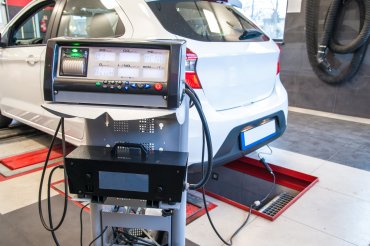
The European Parliament voted Wednesday to adopt stricter carbon dioxide emission standards for new cars and vans in the European Union after 2020 in an effort to put the EU on track to become climate neutral.
Members of the European Parliament and EU ministers agreed on a 37.5 percent CO2 reduction target for new cars – more than the European Commissions proposed target of 30 percent – and a 31 percent CO2 reduction target for vans by 2030. These standards are part of the clean mobility package, which aims to pave the way for a climate-neutral economy in line with the EUs Paris Agreement commitments.

Photo: damiangretka/Shutterstock
A display screen with exhaust gas measurement indicators at a diagnostic station for vehicles. The European Parliament voted Wednesday to adopt stricter carbon dioxide emission standards for new cars and vans in the EU after 2020
Despite reported opposition from the automobile industry and some EU member states, the legislation was adopted with 521 votes for it, with 34 abstaining and 63 no votes.
Manufacturers whose average emissions surpass the set limits will each pay an excess emissions premium. By 2023, the European Commission will have to evaluate whether or not to allocate these amounts to a specific fund in order to transition towards zero-emission mobility, and to support skills formation for workers in the automotive sector, the EU Parliament stated in a report.
The commission will also have until 2023 to decide whether or not to have a common methodology for assessment and consistent data reporting.
The new targets and incentives will help EU industry embrace innovation towards zero-emission mobility and further strengthen its global leadership in clean vehicles. At the same time, the gradual transition will allow sufficient time for reskilling and upskilling of workers, so that no one is left behind in this transition, said Miguel Arias Canete, the EUs commissioner for climate action and energy.
According to the commission, this legislation comes with a technology-neutral incentive mechanism for zero- and low-emission vehicles, encouraging the market to invest in clean vehicles. The incentive covers both zero-emission vehicles, such as battery electric or fuel cell vehicles, and low-emission vehicles having tailpipe emissions of less than 50 grams of CO2 per kilometer – these are mainly plug-in hybrid vehicles equipped with both a conventional and an electric engine, the commission noted in a press release.
The EU already has among the worlds tightest standards for CO2emissions or fuel economy. Standards around the world have been ratcheted in recent years, leading automakers to search for various ways to boost fuel economy. One approach has been to demand engine oils that contribute to fuel economy, and the lubes industry has responded by developing lighter engine oils.
Further upgrades in performance could lead to still lighter oils or could further encourage the uptake of low-emissions vehicle technologies such as electric vehicles.